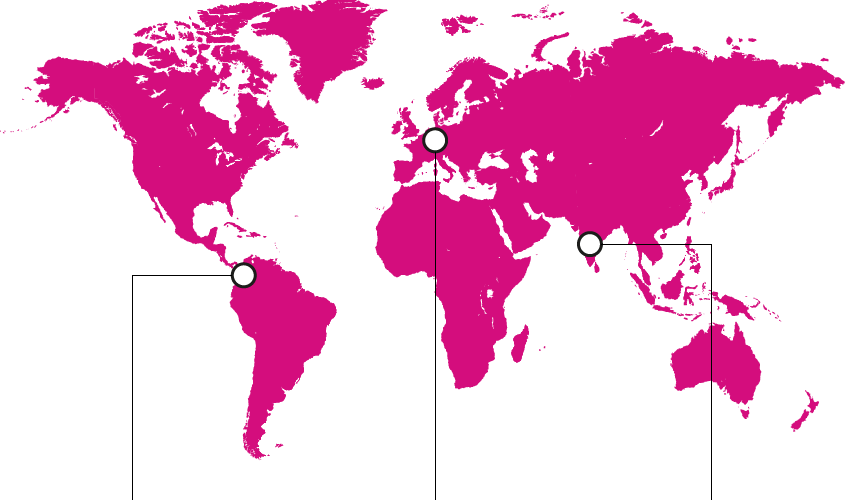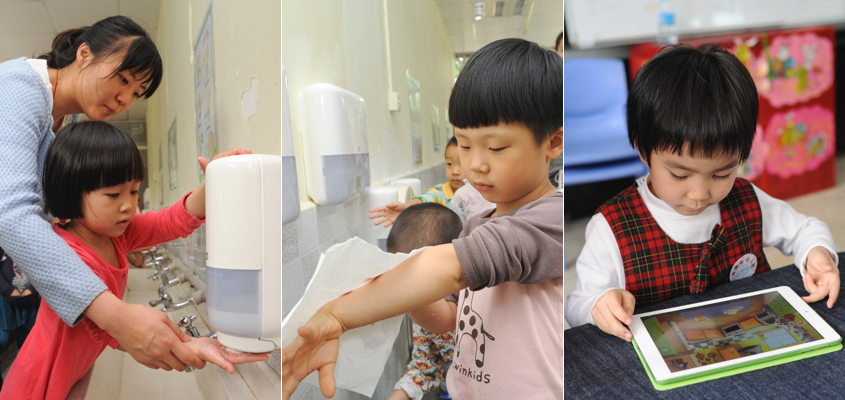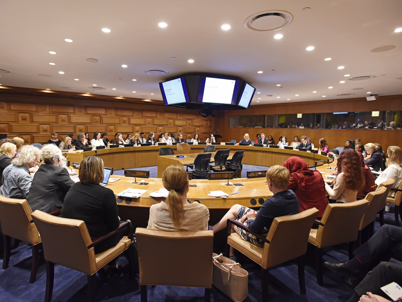Knowledge is key
The world would be a much better place if everybody had access to clean water, sanitation and effective hygiene products – and knowledge of the link between hygiene, health and quality of life. We share our knowledge of hygiene with girls, women, children, parents, relatives and caregivers across the globe.
Number of people who received training during the year
2,000,000


107,000
In Colombia, SCA’s joint-venture company Familia educated 107,000 expecting mothers about motherhood and pregnancy.

33,000
SCA provided training for 33,000 nurses worldwide in incontinence and skincare. The photo above is from a workshop in India.

14,000
SCA teaches children around the world about hand washing with the help of “Ella’s hand washing adventure,” an app for iPad and Android devices that has become very popular for teaching young children to wash their hands. In 2015, the app was downloaded 5,500 times and 8,500 training packs were distributed to preschools.
Value for society in China

While SCA’s and Vinda’s work with incontinence in China represents a successful business operation for the company, it is also generating considerable value for society. Incontinence adversely impacts individuals, as well as their families and relatives. Improved continence care increases productivity, while reducing the risk of related diseases. This was demonstrated in a report compiled by SCA together with the international consultancy firm Accenture.
SCA’s work in Beijing, Shanghai and Guangdong has directly improved the quality of life of more than 100,000 individuals suffering from incontinence. For example, SCA has provided training for more than 14,000 nurses and other incontinence care professionals. It is estimated that more than USD 40m in value has been generated for society in the form of improved work capacity, reduced stress and the prevention of related diseases.
The report shows how important it is that decision-makers and the business sector work together. Sharing the same objectives and cooperating in the areas of competency, structure and resources can improve quality of life and create more opportunities for people to live the life they choose.

SCA takes up the fight against childhood disease in China
Some 50,000 cases of hand, foot and mouth disease are reported in China every year. HFMD, as the viral infection is also known, mainly affects infants and young children, causing blisters, sore throat, diarrhea and fever. Since there is no specific treatment, preventing the virus is by far the best solution.
The Shenzhen Center for Disease Control and Prevention in China and a Dutch university have concluded in a study that thorough hand washing can help prevent the spread of the virus and significantly reduce the risk of HFMD for children. Over the course of the six-month study, SCA and Vinda provided 18 preschools with Tork dispensers, paper towels and soap, reaching over 8,000 children and nearly 650 teachers. Antibacterial Vinda wet wipes were also handed out to 2,200 households to facilitate good hand hygiene at home.
To encourage good hand hygiene habits, the teachers and children at the preschools focused on washing their hands and the children were educated about hand hygiene. They also practiced with the help of “Ella’s hand washing adventure,” an app developed by Tork to teach children to wash their hands properly to remove dirt and bacteria (can be downloaded from App Store or Google Play). This is the first quantitative study of this scale in China to establish a link between early hand hygiene intervention and disease prevention in young children.
SCA breaks the silence on menstruation

The taboos, ignorance and preconceptions surrounding menstruation are jeopardizing the health of millions of women every day, particularly in emerging markets. But menstruation is also a subject that few people talk about in more developed countries. SCA’s partnership with the UN Water Supply and Sanitation Collaborative Council (WSSCC) is an example of the company’s proactive efforts to break the taboos surrounding menstruation, and raise awareness of the importance of good menstrual hygiene.
WSSCC is the only UN body that works exclusively with hygiene and sanitation, and the partnership with SCA has involved a number of joint activities, such as a menstrual hygiene management training for young girls in conjunction with Team SCA’s stopover in Sanya, China in early 2015. In May, a seminar was held at the UN Headquarters in New York in which SCA’s SVP Communications Joséphine Edwall Björklund and SVP Sustainability Kersti Strandqvist participated. Attendees included representatives of various NGOs and UN bodies, decision-makers and members of the business community. The seminar focused on how the taboos surrounding menstruation impact women’s role in society and how cooperation between public and private sectors can make a difference. Hygiene seminars and activities designed to influence public opinion have also been carried out within the framework of the partnership.
